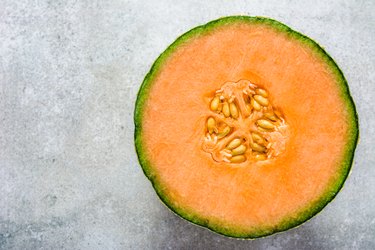
Do you have a sore tongue after eating fruit? Depending on what other symptoms you experience, you might be dealing with canker sores, mouth ulcers or even vitamin B deficiencies. Some fruits, especially citrus, are more likely to cause a tingling or burning sensation.
Allergies and Tongue Soreness
Video of the Day
A common cause of tongue discomfort is oral allergy syndrome (OAS), or pollen fruit syndrome. About 50 to 75 percent of adults are allergic to pollen, according to the American Academy of Allergy, Asthma and Immunology (AAAI). Since many fruits and vegetables contain proteins resembling those found in pollen, they may cause an allergic reaction.
Video of the Day
OAS typically affects the mouth and throat, but it may also cause generalized allergic reactions. You may experience swelling of the tongue and lips, mouth itching, runny eyes, sneezing, stomach pain and vomiting, among other symptoms. In severe cases, this condition can make it difficult to breathe or swallow, or it can trigger anaphylaxis, a life-threatening reaction. Its symptoms vary from one individual to another.
While it's true that OAS may cause mouth discomfort, tongue soreness isn't a common reaction. Certain fruits, especially apples, peaches, pears, nectarines and strawberries, can make your mouth itchy, but they're unlikely to cause a sore tongue. Pineapple, for instance, contains the enzyme bromelain, which may cause a burning sensation in your mouth, among other symptoms.
Banana allergies may pose problems too as they cause symptoms in about 20 to 50 percent of those who are also allergic to natural rubber latex. This fruit contains three major allergens that may trigger mild local symptoms affecting the mouth and throat, as reported in a November 2015 review published in European Annals of Allergy and Clinical Immunology. Again, tongue pain or soreness is not common.
Sore Tongue After Eating Fruit?
A sore tongue after eating banana, apples or other fruits may not necessarily be related to the fruit itself. Oral thrush, for instance, may cause a sore tongue or sore gums, cracks at the corners of the mouth or white patches in the oral cavity. This fungal infection often results from Candida overgrowth and may spread to your tonsils and throat, notes the Mayo Clinic.
Read more: Foods to Avoid When You Have Oral Thrush
Similarly, mouth ulcers and canker sores may cause pain and discomfort in the oral cavity. Oral aphthous ulcers, for example, affect up to 10 percent of the Caucasian population, according to a research paper published in the October 2014 issue of Deutsches Ärzteblatt International. Some forms are extremely painful and may leave scars. Acidic foods and beverages, including fruit juices and citrus fruits, can worsen your symptoms and slow healing.
If you have mouth ulcers and experience tongue soreness after eating oranges, it makes sense to cut these fruits out of your diet until your symptoms subside. The same goes for canker sores, which may form under your tongue and cause pain.
Beware of Nutrient Deficiencies
Another common cause of tongue soreness is vitamin B12 deficiency. This nutrient supports neurological function and helps your body produce red blood cells, points out the National Institutes of Health.
Low vitamin B12 levels can lead to anemia, mouth ulcers, vision problems, depression and irritability. Another symptom is glossitis, a condition that causes a sore, red tongue. Tenderness and swelling of the tongue are common, too.
Although these symptoms are not related to fruit consumption, some fruits may worsen the pain. Less common causes include viral infections, iron deficiency anemia, burning mouth syndrome and certain medications, such as beta-blockers, which promote the formation of mouth ulcers.
Eliminate tart, acidic and salty foods from your diet for a week or so. Tomatoes, fruit juices and citrus fruits are highly acidic, so cut them out and see how your body reacts. Also, try to avoid spices and firm fruits, such as apples, as they can irritate a sore mouth. If your symptoms persist, consult a health provider to determine the cause and receive treatment.
- AAAI: "Oral Allergy Syndrome (OAS) or Pollen Fruit Syndrome (PFS)"
- Anaphylaxis Campaign: "Oral Allergy Syndrome"
- European Annals of Allergy and Clinical Immunology: "An Overview of Fruit Allergy and the Causative Allergens"
- NHS: "Oral Thrush (Mouth Thrush)"
- Mayo Clinic: "Oral Thrush"
- U.S. National Library of Medicine: "Canker Sore"
- Deutsches Ärzteblatt International: "The Treatment of Chronic Recurrent Oral Aphthous Ulcers"
- National Institutes of Health: "Vitamin B12"
- NHS: "Vitamin B12 or Folate Deficiency Anaemia"
- U.S. National Library of Medicine: "Glossitis"
- Welsh Ambulance Services NHS Trust: "Tongue Pain"
- American Dental Association: "Erosion: What You Eat and Drink Can Impact Teeth"
- University of Melbourne: "The Flesh-Eating Pineapple"